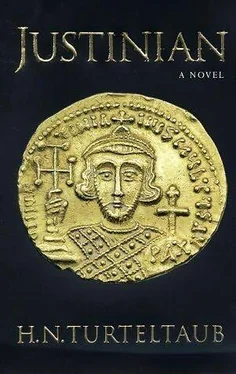Harry Turtledove - Justinian
Здесь есть возможность читать онлайн «Harry Turtledove - Justinian» весь текст электронной книги совершенно бесплатно (целиком полную версию без сокращений). В некоторых случаях можно слушать аудио, скачать через торрент в формате fb2 и присутствует краткое содержание. Жанр: Историческая проза, на английском языке. Описание произведения, (предисловие) а так же отзывы посетителей доступны на портале библиотеки ЛибКат.
- Название:Justinian
- Автор:
- Жанр:
- Год:неизвестен
- ISBN:нет данных
- Рейтинг книги:3 / 5. Голосов: 1
-
Избранное:Добавить в избранное
- Отзывы:
-
Ваша оценка:
- 60
- 1
- 2
- 3
- 4
- 5
Justinian: краткое содержание, описание и аннотация
Предлагаем к чтению аннотацию, описание, краткое содержание или предисловие (зависит от того, что написал сам автор книги «Justinian»). Если вы не нашли необходимую информацию о книге — напишите в комментариях, мы постараемся отыскать её.
Justinian — читать онлайн бесплатно полную книгу (весь текст) целиком
Ниже представлен текст книги, разбитый по страницам. Система сохранения места последней прочитанной страницы, позволяет с удобством читать онлайн бесплатно книгу «Justinian», без необходимости каждый раз заново искать на чём Вы остановились. Поставьте закладку, и сможете в любой момент перейти на страницу, на которой закончили чтение.
Интервал:
Закладка:
"Console yourself, Empress, with the knowledge that your husband has gone from this world into one far better, one where he will know God face to face," the ecumenical patriarch told her, pausing for a moment in his prayers.
"What you say is true," my mother answered through her tears, "but life is hard for those left behind." That also being true, George bowed his head in silent agreement. His lips had a bluish tinge to them; before long, he too would know God face to face.
When the last prayers were over and we went out of the mausoleum, the young, strong priest had George put an arm around his neck and bore most of his weight and the climb upstairs. While performing his ecclesiastical duties, the patriarch was strong and vigorous. When he had to be a mere man, he faded. Either his spirit or the spirit of God working within him imbued him with holy zeal, in the same way that soldiers in the heat of battle perform prodigies of valor they cannot even contemplate when times are quiet.
Once on the main level of the church, George sank panting into a chair with a back of carved ivory that had been placed by the altar, perhaps, for just such a need. I strode up to him and said, "I hope you will be well soon." That was true; I did not expect it, but I hoped.
He caught all the meanings underlying my words. "I will be well enough," he said, "for your coronation."
I assumed the imperial crown four days later, a week to the day after my father's passing. Instead of the black robes of mourning, I donned for the first time the full imperial regalia: the long red tunic, the skaramangion; over it the cloak known as the sagion or, in the ancient usage, the chlamys, in purple with gold-embroidered border and ornamented with shimmering pearls; the long bejeweled scarf of the loros draped over my chest in the shape of the letter chi- X- symbolizing Christ's holy and victorious cross; and on my feet the tzagia, the purple boots, permitted to the Emperor alone.
The procession from the great palace to the church of the Holy Wisdom was not what I had imagined it would be when I was small. I had thought of being crowned a junior Emperor like my uncles, and had expected them to be there along with my father and my brother. But they were mutilated and exiled, and my brother and father dead. I was the center of every eye, and would be for as long as I ruled- for the rest of my life, I thought, not knowing all that lay before me.
My mother, still in black, walked behind me to the great church. Excubitores, now resplendent once more rather than somber, kept back the people who crowded close. Some of the people's exuberance, surely, was due to the pleasure Constantinopolitans take at spectacle of any sort, but more sprang from the silver miliaresia and gold nomismata palace servitors flung into the crowd as largesse to celebrate my coronation.
Late in my father's reign, the imperial mint was lucky enough to find a certain Cyril, an engraver of such genius that he could show a man's perfect portrait in the compass of a coin no broader than a thumbnail. Having made the last nomismata of my father's reign marvels to behold, he now worked his magic with me. Some of the gold pieces the servitors gave out had my picture on them, as I looked then: under the imperial diadem I would don that day, a long, thin face with rather pinched cheeks and a narrow, pointed chin. As my beard was still thin and spotty, I shaved my cheeks and jaw, a practice I would soon give up. I do not know what prodigies of labor Cyril required to ready these new nomismata for the day, but ready they were.
And ready- and more than ready- the crowds were to receive them. Fights broke out among the people struggling for them, as always happens at such affairs. So long as men battled only with fists and elbows and knees, the excubitores took no notice of their sport. But when, just as we arrived at the church of the Holy Wisdom, one ruffian stuck a knife into another not twenty feet from where I stood, the guardsmen waded into the crowd and seized him. The victim, I believe, recovered.
Stephen the Persian turned to me. "Emperor, must we give out this largesse?" he asked in his sweet eunuch's voice. "It brings with it nothing but strife."
"We'd have worse strife if we didn't," I answered. "The people expect it, and if they don't get what they expect…"
He sniffed. "Mob rule," he said disdainfully. And, though I think more than half his objection sprang from spending the money, I have seen enough of demokratia since that day to admit he had a point. And since, in his blind avidity for gold, he incited the mob against him (among other outrages)…
But my pen races years ahead of events. To divert the city mob from its squabbles over coins, I signaled for the excubitores to raise me on a shield, thereby showing the army accepted me as legitimate heir to my father. The four men chosen for the ceremony were Christopher the count of the excubitores; his mandator, Theodore of Koloneia, of whom I have already had a good deal to say; a captain who must then have been prominent but of whom I remember nothing save a huge black mole right between his eyes; and faithful Myakes.
I promoted him to officer's rank so he would not seem out of place alongside his colleagues in the ceremony. To my surprise, he tried to refuse the promotion, surely one of the rare instances in the history of the Roman Empire where a man sought to avoid aggrandizing himself rather than the reverse. But when I ordered him to accept, he obeyed, for how can any man refuse the command of the Emperor?
MYAKES
Christian humility, Brother Elpidios? I wish I could take credit for it, but that's not what made me want to stay a simple soldier. Why did I? Nothing simpler: I was happy right where I was. The duty was easy, the pay was fine, I had plenty of good food to eat and good wine to drink, and the girls were just as impressed by a plain excubitor as they would have been by a fancy one, if you take my meaning.
Officers yelled, officers worried, officers had to keep track of a pack of wild men like me. From where I stood, it looked like too much work to be worth the bother. And when Justinian promoted me in spite of my squawks, I found out I was right: it was too much work to be worth the bother.
But he's right. Once he'd said yes, I couldn't say no.
These four men, then, hoisted me up on that shield for the crowd to see. Though no Emperor had been crowned for almost a generation, the people knew (and some, at least, had been rehearsed in) their role. "Tu vincas, Justinian!" they shouted, and then other acclamations, some of them quite antiquated, suitable for the occasion: "Many years, Justinian!" "Justinian, ruler of the world!" "Flourish, Justinian, bestower of honors!" Then came a new acclamation, one devised by Stephen the Persian: "Hail, Justinian, restorer of a rich name!"
I stood on the shield, supported by the stalwart shoulders of Myakes and of the three other officers of the excubitores, waving out to the people, letting them see me, and letting them get used to the idea that I rather than my father would be appearing on ceremonial occasions from now on. They waved back at me and kept on cheering, more, I daresay, for the diversion I represented than for any virtues inherent in myself. An elephant might have done even better, but we had no elephants, so they had to content themselves with me.
After the city mob had gawped at me long enough, I looked down at Christopher and hissed, "Get on with it!" The count of the excubitores, Myakes, Theodore of Koloneia, and that captain, whoever he was, slowly carried me into the church of the Holy Wisdom. The folk outside bore up philosophically at being deprived of my presence, for the palace servitors threw fresh handfuls of coins into the crowd.
Читать дальшеИнтервал:
Закладка:
Похожие книги на «Justinian»
Представляем Вашему вниманию похожие книги на «Justinian» списком для выбора. Мы отобрали схожую по названию и смыслу литературу в надежде предоставить читателям больше вариантов отыскать новые, интересные, ещё непрочитанные произведения.
Обсуждение, отзывы о книге «Justinian» и просто собственные мнения читателей. Оставьте ваши комментарии, напишите, что Вы думаете о произведении, его смысле или главных героях. Укажите что конкретно понравилось, а что нет, и почему Вы так считаете.












